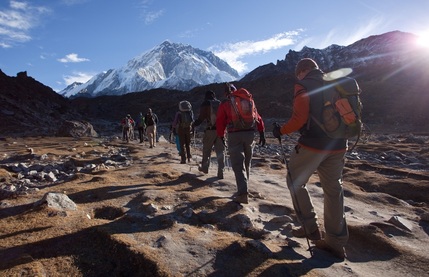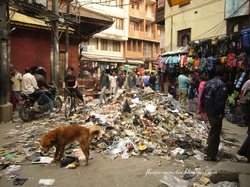
The purchasing power tourists can be highly influential to the practices of sellers. Locals of third world countries will partake in environmentally damaging behaviors if tourists are willing to pay for it. Therefore one of the best ways we can influence impacts on the environment is by being conscientious consumers.
Fortunately, tourists are starting to recognize their power as consumers, and tour companies are trying to tap into this market by advertising “eco-friendly” tours. However, many of these companies are advertising themselves as “eco-friendly”, but are doing little to contribute to environments and local communities. This is why it is critical for the consumer to be educated in ecotourism and be able to identify companies that abide by its principals.
So what is ecotourism? Ecotourism is defined as:
· “Responsible travel to natural areas that conserves the environment and the well being of local people”
I have identified a tour company called Eco Trek Nepal that seems committed to this idea of ecotourism. They provide guided tours around Nepal focusing on trekking throughout the Himalayas. They offer tours to the most popular regions of the country but specialize in tours that get people to more remote regions. I have identified them because they abide by two of the main fundamentals of ecotourism:
1. It should provide long-term benefits -to the resource, to the local community, and to industry (benefits may be conservation, scientific, social, cultural, or economic) (Wight, 1993).
2. It should involve education among all parties-local communities, government, non-government organizations, industry, and tourists (Wight, 1993).
The company adheres to these principles in a number of ways. They provide benefits to the resource by adhering to leave no trace trekking principals. One of the main problems facing Nepal is the disposal of plastic water bottles used by tourists. Eco Trek Nepal uses water purification systems and reusable water bottles so they do not contribute to this build up of waste. Another issue: Is deforestation to produce firewood to heat trekking lodges. Eco Tours brings in their own fuel source for heating so they do not have to rely on a limited supply of firewood. Additionally, they contribute to maintaining environments and cultures by getting “off the beaten path”, thus preserving more highly trafficked regions. By hiring local guides, cooks, and porters they contribute economically to local communities. Having a company that is reveals the natural and cultural wonders of Nepal, while making efforts towards sustainable tourism is a major benefit to the tourist industry of Nepal.
Education is another component to this company that contributes to ecotourism. Their website contains a wealth of knowledge on how to be a responsible traveler. Hiring experienced local guides educates tourists on local customs and culture. One of the main contributions they make to the community is by investing a portion of their profits in educating children on how to sustainably build communities and contribute to health and sanitation.
As consumers, we hold the power to influence the practices of tour companies. By purchasing tours through eco-friendly companies like Eco Tours Nepal, we encourage other companies to fall inline. Make sure you are educated on the practices of a company before you book a tour. Money talks, make sure your money is sending the right message.
Fortunately, tourists are starting to recognize their power as consumers, and tour companies are trying to tap into this market by advertising “eco-friendly” tours. However, many of these companies are advertising themselves as “eco-friendly”, but are doing little to contribute to environments and local communities. This is why it is critical for the consumer to be educated in ecotourism and be able to identify companies that abide by its principals.
So what is ecotourism? Ecotourism is defined as:
· “Responsible travel to natural areas that conserves the environment and the well being of local people”
I have identified a tour company called Eco Trek Nepal that seems committed to this idea of ecotourism. They provide guided tours around Nepal focusing on trekking throughout the Himalayas. They offer tours to the most popular regions of the country but specialize in tours that get people to more remote regions. I have identified them because they abide by two of the main fundamentals of ecotourism:
1. It should provide long-term benefits -to the resource, to the local community, and to industry (benefits may be conservation, scientific, social, cultural, or economic) (Wight, 1993).
2. It should involve education among all parties-local communities, government, non-government organizations, industry, and tourists (Wight, 1993).
The company adheres to these principles in a number of ways. They provide benefits to the resource by adhering to leave no trace trekking principals. One of the main problems facing Nepal is the disposal of plastic water bottles used by tourists. Eco Trek Nepal uses water purification systems and reusable water bottles so they do not contribute to this build up of waste. Another issue: Is deforestation to produce firewood to heat trekking lodges. Eco Tours brings in their own fuel source for heating so they do not have to rely on a limited supply of firewood. Additionally, they contribute to maintaining environments and cultures by getting “off the beaten path”, thus preserving more highly trafficked regions. By hiring local guides, cooks, and porters they contribute economically to local communities. Having a company that is reveals the natural and cultural wonders of Nepal, while making efforts towards sustainable tourism is a major benefit to the tourist industry of Nepal.
Education is another component to this company that contributes to ecotourism. Their website contains a wealth of knowledge on how to be a responsible traveler. Hiring experienced local guides educates tourists on local customs and culture. One of the main contributions they make to the community is by investing a portion of their profits in educating children on how to sustainably build communities and contribute to health and sanitation.
As consumers, we hold the power to influence the practices of tour companies. By purchasing tours through eco-friendly companies like Eco Tours Nepal, we encourage other companies to fall inline. Make sure you are educated on the practices of a company before you book a tour. Money talks, make sure your money is sending the right message.

 RSS Feed
RSS Feed